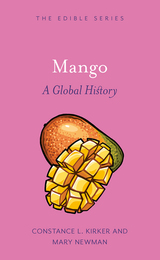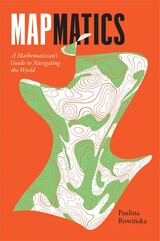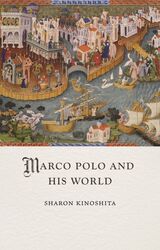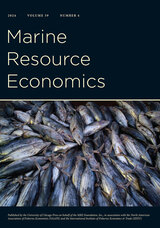12 start with M start with M
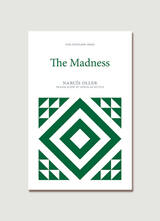
As relevant and entertaining now as it was when it was first published, this lively translation brings this fantastic piece of literature to new, modern audiences while drawing parallels with some of the 19th century’s greatest English language writers such as Charles Dickens and Thomas Hardy.

Simon Blef, who comes from “a small, stifling country without a sea” in some corner of Europe, has gone to live in the Netherlands. There he has found a wife and hopes he may yet find work. He is making preparations: he carries around a notebook and jots down his thoughts. One day he would like to write a novel, but in the meantime, he records, embellishes, invents, and combines what he sees with what he dreams: the happy, hard-working Dutch, with their seventy-year-old hippies—the “superannuated generation of rockers”— and their new “sexless generation,” as well as the tourists and immigrants from beyond the seven seas.
Set in a single day, Making Skeletons Dance is full of impressionistic musings, in equal measure mordant and humorous. Simon has left his small unhappy country to get away from the past—but how is it that the past is so devilishly resourceful, liable to turn up in any Amsterdam pub? As the afternoon wears on, the drama of his life unfolds in fascinating detail, be it comedy or tragedy, or both.
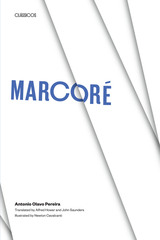
Marcoré, first published in Rio de Janeiro in 1957, won the coveted prize for fiction awarded by the Brazilian Academy of Letters and has been praised by leading critics and writers in Brazil. The novel has maintained favor with the Brazilian public and has also been published and received with enthusiasm in Portugal.
Adopting the intimist, introspective approach characteristic of such writers as Machado de Assis and Graciliano Ramos, Pereira tells a moving, bittersweet tale of personal problems and family relationships. The central character of Marcoré is the narrator, a modest, introverted individual who, aware of his own human condition, tends to view life with pessimism tempered with compassion.
As the narrator reflects on his life and relationships in a small town in the state of São Paulo, an unobtrusive document of Brazilian family life unfolds. The novel contains several highly dramatic scenes as well as many tender and entertaining ones and introduces a set of very human, very credible characters, including a most irascible mother-in-law and a wife who makes a strange vow.
The reactions, thoughts, and hidden motivations of the characters are revealed in precise and economical language—evidence of the author's powers of observation and knowledge of human nature.
Rachel de Queiroz has described Marcoré as "a beautiful and tormented book." It has become a modern Brazilian classic.

Using North American, Native American, Russian, Egyptian, Indian, and Chinese novels and poems, Ziolkowski explores the supposed progress that these structures bring. The book asks how the human urge to exploit and control waterways has affected our relationships to nature and the environment and argues that the high modernism of the twentieth century, along with its preoccupation with development, casts the hydroelectric dam as a central symbol of domination over nature and the power of the nation state.
Beyond examining the exultation of large dams as symbols of progress, Mega-Dams in World Literature takes a broad international and cultural approach that humanizes and personalizes the major issues associated with large dams through nuanced analyses, paying particular attention to issues engendered by high modernism and settler colonialism. Both general and specialist readers interested in human-environment relationships will enjoy this prescient book.
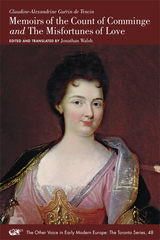
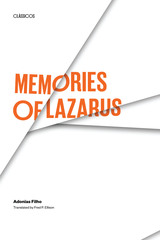
These are the recollections of Alexandre—of his life, his death-in-life, and his ultimate death, as they are played out against the mobile tapestry of the valley where he was born. The valley itself, in the backlands of the state of Bahia, Brazil, alternates at different stages in Alexandre’s consciousness between reality and symbol. It swings from a harsh regional specificity to become the panorama of all human life, its endless, eroding wind the devouring hostility of all environments and its pain the pain of every human being in the face of his own brutality and that of others.
Throughout the novel Alexandre’s mind ranges from sharp awareness, through hallucination, to oblivion (“a man dies while alive,” says Jeronimo, his mentor), and back again as he experiences the violent, obtuse phenomena of life in the valley—his universe and ours. This latter-day Lazarus leaves the resisting hills and black sky once only, hounded by the valley dwellers who believe he has murdered his wife, her father, and her brother. Yet despite his awareness of the horror of the valley and his intuition of something beyond it, it is precisely his contact with the gentler existence to which he escapes that forces Alexandre to recognize his nature for what it is. Turning his back on a greater and more varied range of feeling and experience, he chooses the narrow ferocity of the valley, to which he returns to die the final death for which the earlier deaths have prepared him.
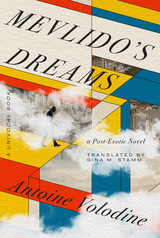
A postapocalyptic noir that asks if love and political ideals can survive civilizational collapse
A meditative, postapocalyptic noir, Mevlido’s Dreams is an urgent communiqué from a far-future reality of irreversible environmental damage and civilizational collapse. Mevlido is a double agent working for the police and living in the last habitable city on the planet, a sprawling abyssal ruin marked by war and ruled by criminals. Suspended in the bardo between his loyalty to the surveillance state and to the anarchists, communists, and other rebels he monitors, Mevlido clings to life and hope—barely—in the city’s vast slums, haunted by the memory of the wife he failed to save during the last war and dreaming of a mysterious mission he is told he must accomplish. At the same time, an enigmatic organization existing elsewhere—the Organs—observes Mevlido’s actions and debates its responsibility to him and to humanity as a whole.
Asking what it means to love and care for others at the end of the world, this dense, brilliantly detailed postcollapse reality imagined by Antoine Volodine is one that grows ever more relevant amidst intensifying climate and political catastrophes. A key work in Volodine’s post-exotic fictional universe, Mevlido’s Dreams envisions a world changed beyond recognition and ruled under irrational authoritarianism in which dreams nest within dreams and the boundaries between life and death are fluid and uncertain.
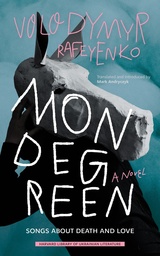
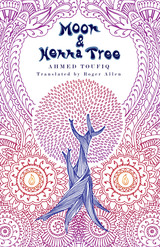
Set in the High Atlas in pre-modern Morocco, Moon and Henna Tree chronicles the rise and fall of a local potentate, Hmmu. Not content with the territory left to him upon his father’s death, Hmmu, under the influence of his scheming advisor, Ibn al-Zara, begins a campaign to acquire those lands that adjoin his, either through marriage or physical force.
Ahmed Toufiq’s subtle investigation of the abuse of power and its effects on those who suffer under its tyranny also provides a unique look at Amazigh (Berber) culture. While most of Toufiq’s contemporaries focus on modern urban Morocco, he provides a fascinating, and accurate, account of the customs and traditions of a large, yet often ignored, segment of the population. Moon and Henna Tree (in the original Arabic) won the Moroccan Book Prize in 1989.

As Charlie McCarthy is to Edgar Bergen, so is Martin T. Dooley to newspaper humorist Finley Peter Dunne. Mr. Dooley in Peace and in War, originally published in 1898, collects brief, humorous pieces Dunne wrote for the Chicago Evening Post and the Chicago Journal. In an Irish-American dialect as thick as the foam on a pint of stout, Mr. Dooley and his friends discuss the military "sthrateejy" for American action in Cuba, "iliction" day shenanigans, Queen Victoria's jubilee, the "new woman," and the strange American sport of football, in which a player puts "a pair iv matthresses on his legs, a pillow behind, [and] a mask over his nose" and tries to kill his fellow men. Through his tall tales and speculations, Mr. Dooley reveals the pleasure and pain of being Irish in Chicago at the turn of the twentieth century.
Clothed in the charming hyperbole and mislocution of the unflappable Mr. Dooley, Dunne's incisive social criticism flies unerringly to the target, exposing prejudice, hypocrisy, insensitivity, and plain old-fashioned humbug.
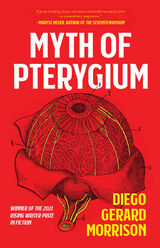
This debut novel is set in a vaguely dystopian, yet also realistic, Mexico City—endless traffic jams, relentless clouds of pollution, economic hardships, and the ever-present threat of drug cartels. The unnamed narrator of the novel, at times referred to as Arthur—in part because of the growing similarity of his life with Arthur Rimbaud’s—struggles with the dissonance of leading an artistic life while providing for his family. A failed, penniless poet with a child on the way, he is forced to take a job in his family’s weapons dealing enterprise, which he soon discovers is connected to the corrupt Mexican armed forces and drug cartels, who are responsible for the increasing death toll in the country. All the while, the narrator struggles with a growing condition in his right eye, a pterygium, that is slowly taking over his vision, blurring the events of his life, including his wife’s complicated pregnancy, extortions by the drug cartels, and his own relationship to his writing. As the narrator gradually finds his life spiraling out of control, the novel moves quickly to a startling conclusion.
Myth of Pterygium is the winner of the 2021 Autumn House Rising Writer Prize in Fiction, selected by Maryse Meijer.
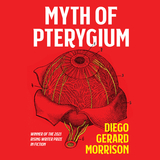
This debut novel is set in a vaguely dystopian, yet also realistic, Mexico City—endless traffic jams, relentless clouds of pollution, economic hardships, and the ever-present threat of drug cartels. The unnamed narrator of the novel, at times referred to as Arthur—in part because of the growing similarity of his life with Arthur Rimbaud’s—struggles with the dissonance of leading an artistic life while providing for his family. A failed, penniless poet with a child on the way, he is forced to take a job in his family’s weapons dealing enterprise, which he soon discovers is connected to the corrupt Mexican armed forces and drug cartels, who are responsible for the increasing death toll in the country. All the while, the narrator struggles with a growing condition in his right eye, a pterygium, that is slowly taking over his vision, blurring the events of his life, including his wife’s complicated pregnancy, extortions by the drug cartels, and his own relationship to his writing. As the narrator gradually finds his life spiraling out of control, the novel moves quickly to a startling conclusion.
Myth of Pterygium is the winner of the 2021 Autumn House Rising Writer Prize in Fiction, selected by Maryse Meijer.
READERS
Browse our collection.
PUBLISHERS
See BiblioVault's publisher services.
STUDENT SERVICES
Files for college accessibility offices.
UChicago Accessibility Resources
home | accessibility | search | about | contact us
BiblioVault ® 2001 - 2024
The University of Chicago Press



